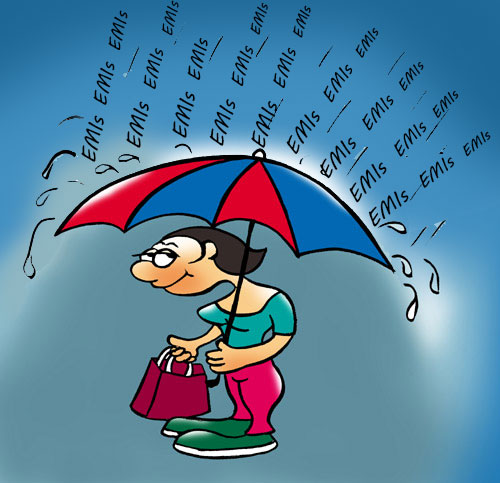Photographs: Utam Ghosh/Rediff.com Rajiv Raj
Of course, NO! You must think of EMI option if and only if you are on the verge of defaulting on a payment.
Having said that here are some pros and cons of paying your credit card dues on equated monthly installments...
How attractive is the EMI option?
Any financial product that comes with perks, if not used judiciously, also has certain disadvantages that can be very expensive. Take for instance, credit cards.
While the use of credit cards as a mode of payment has caught on well, most people don't realise the other side of using credit cards if one does not follow financial discipline.
If you spend beyond your repaying capacity, most credit cards charge prohibitively high interest rates in the range of 36 per cent and 45 per cent if the outstanding credit card bill is not paid.
To deal with this, one may opt for equated monthly installment (EMI) route that comes at lower rate of interest. Interestingly, one question, I am frequently asked is: how hassle-free and attractive option an EMI option of a credit care is?
Reader Invite
Did you ever opt for the EMI facility to repay your credit card outstanding?
Did you find it helpful? How?
Or did it further push you into a debt trap?
Please share your experience with us!
Mail your response to getahead@rediff.co.in (subject line: EMI on credit card) and we will post the most interesting ones right here on Rediff.com.
The author is a credit expert with 10 years of experience in personal finance and consumer banking industry and another 7 years in credit bureau sector. Rajiv was instrumental in setting up India's first credit bureau, Credit Information Bureau (India) Limited (CIBIL). He has also worked with Citibank, Canara Bank, HDFC Bank, IDBI Bank and Experian in various capacities.
Please click NEXT to find out...
Should you go for EMI on credit cards?
Photographs: Utam Ghosh/Rediff.com
Though it may appear too basic a thing, it is important that you should know whether your card has an EMI facility.
Many credit card issuers -- public and private banks too -- offer EMI cards. Banks permit an outstanding of up to Rs 5 lakh for EMI facility and the rate of interest charged stands in the range of 16 per cent to 22 per cent.
If your credit card does not have EMI facility, you should check with the card-issuing bank. If the credit card does not offer EMI repayment option, then the customer has to either go for a personal loan or transfer the balance to some other credit card to ensure timely repayment of outstanding, failing which s/he has to bear the huge burden of high interest rate applicable on the credit card.
Even if your credit card offers EMI facility to repay credit card outstanding, you have some more factors of which you have to take cognisance of.
Please click NEXT to read what happens when you avail of EMI on your credit card...
Should you go for EMI on credit cards?
Photographs: Utam Ghosh/Rediff.com
The moment you opt for an EMI repayment arrangement, the credit limit stands reduced to the extent of the principal outstanding.
As you keep repaying through EMI, the credit limit is freed.
To put it simply, opting for EMI can block your spending capacity in the subsequent months.
This can be a big factor if you are dependent on your credit card, either to fund your future expense or as a payment mechanism.
Please click NEXT to read about the processing fees banks charge to avail of EMI on your credit card...
Should you go for EMI on credit cards?
Photographs: Utam Ghosh/Rediff.com
Another factor is the one-time processing fee that banks charge to initiate EMI option. This fee is charged upfront and adds to the costs to be paid by the cardholder.
The fee is generally expressed as a percentage of the loan availed on EMI option, and generally capped at a fixed sum of, say Rs 5,000.
You can negotiate this amount, and if you are a loyal customer of the bank for a long term, banks may choose to waive it.
Some banks also offer insurance option to the cardholder.
For an extra charge towards premium, insurance companies offer to pay the outstanding principal in case of an eventuality. This ensures payment of outstanding to the bank and a win-win situation for all three -- the cardholder, the bank and the insurance company.
Besides this, opting for an EMI option can help an individual save his/her credit score from falling.
These three factors present the advantageous side of paying a credit card bill through an EMI option.
Just like these advantages, there are disadvantages too.
Please click NEXT to read about some disadvantages of availing EMI facility on your credit card...
Should you go for EMI on credit cards?
Photographs: Utam Ghosh/Rediff.com
But is this the right and profitable way of repaying your credit card bill?
The plain answer is NO!
You must think of EMI option if and only if you are on the verge of defaulting on a payment.
It saves the individual's CIBIL score from going down.
It is recommended that one should use EMI repayments options sparingly as it can be a burden on one's financials for a prolonged period of time.
Too many EMI arrangements also impact credit score adversely and one would be better off using credit cards when the need is essential and purpose is immediate.
Reader Invite
Did you ever opt for the EMI facility to repay your credit card outstanding?
Did you find it helpful? How?
Or did it further push you into a debt trap?
Please share your experience with us!
Mail your response to getahead@rediff.co.in (subject line: EMI on credit card) and we will post the most interesting ones right here on Rediff.com.







Comment
article